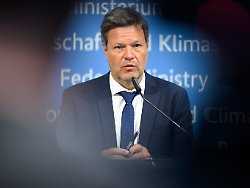sanctions package against Russia
Habeck thinks EU oil embargo is “safe”
May 2, 2022, 9:12 p.m
The EU energy ministers are still unable to agree on an oil embargo against Russia. However, Federal Minister of Economics Habeck assumes that a proposal for a sixth package of sanctions will be made tomorrow. He calls on skeptical countries like Hungary to phase out Russian oil.
Federal Economics Minister Robert Habeck firmly expects an EU oil embargo against Russia. “I’m assuming that oil will be on the sanctions list,” said Habeck after a special meeting of the EU ministers responsible for energy in Brussels. How hard the embargo conditions would be defined is still being discussed. According to his assessment, the EU Commission will propose the sixth package of sanctions against Russia this Tuesday, said the Green politician. It is still open whether the necessary agreement between the member states will be reached by the weekend.
The EU countries would have to decide unanimously on an oil embargo against Russia. Hungarian Prime Minister Viktor Orban threatened to veto the vote after his re-election in early April. In Brussels, an exception clause is currently considered possible for countries that are particularly dependent on Russian oil supplies – such as Hungary. Habeck called on skeptical EU countries to exit Russian oil and gas quickly. Solidarity with Ukraine requires that fossil fuels from Russia be “quickly and drastically reduced”.
Poland called for an immediate import freeze. “Now the hour has come for an oil embargo,” said Environment and Climate Minister Anna Moskwa in Brussels. “Gas is then the second step.” Poland is considered Ukraine’s closest ally on the issue of an energy embargo. Other EU countries warn of costly consequences in Europe. This would mean that fuel prices would continue to skyrocket, according to sources such as Spain, Portugal, Italy and Greece. These countries are pushing for a longer transition period to find alternatives to Russian oil.
Habeck also said in Brussels that an exit from Russian oil would not be feasible without consequences for the country’s own economy. Such a step means “higher inflation, higher energy prices and a strain on the economy”. In Berlin, he had previously emphasized that an oil embargo was “tolerable” for Germany as an economically strong country. According to the federal government, Germany has recently significantly reduced its dependence on Russian oil and gas. In the case of oil, for example, the share had been reduced from 35 percent before the war to 12 percent most recently, Habeck confirmed. Most recently, the EU got more than a quarter of its mineral oil from Russia.
